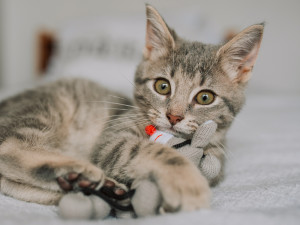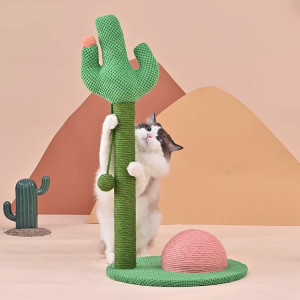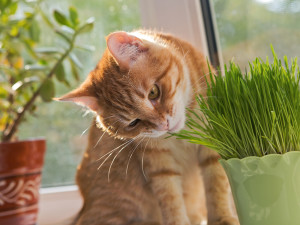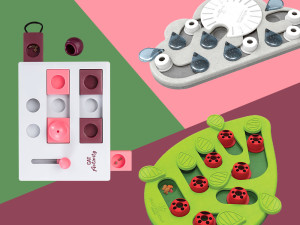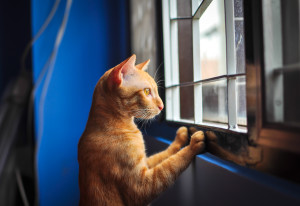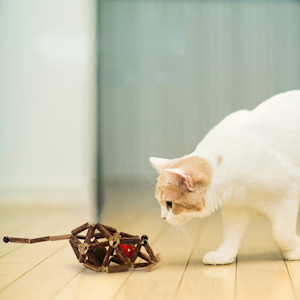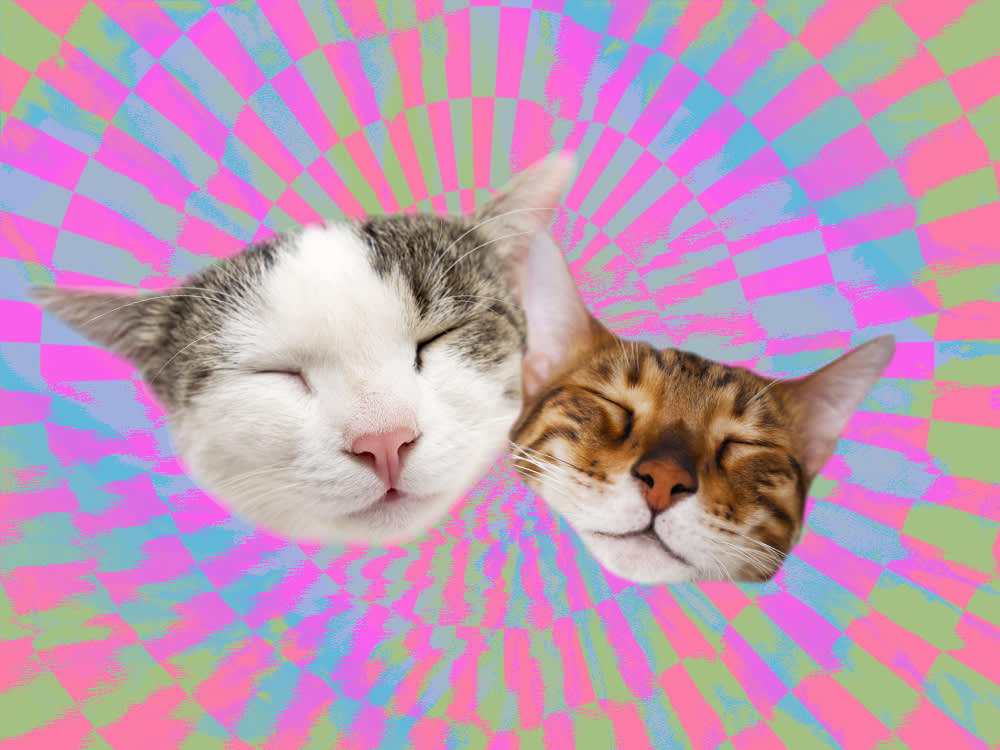
Share Article
Every cat parent knows the amusement of watching their pet trip out on catnip — rolling around in kittenish excitement with a catnip-stuffed toy, which the cat sucks and mauls and chews into a shapeless, saliva-soaked blob. Or you might sprinkle fresh catnip on your cat’s scratching post.
When I do this, Chickpea, my own catnip-obsessive, starts out scratching but pretty quickly stops, hugs the cardboard scratcher, and starts licking the corrugation as though he were possessed and in the throes of love. Other times I’ll just toss some catnip on the floor, at which point he starts ecstatically flipping around in the crumbly green leaves like one might in an ocean of cash.

Get (totally free) deals for food, treats, accessories, tech, and way more pet parenting must-haves.
opens in a new tabFirst of all, can cats eat catnip safely?
The answer is a resounding yes, absolutely. Not only is catnip safe for cats, but it can actually be good for their digestion and often works as an antidiarrheal. That said, try not to go overboard: Too much catnip can cause temporary vomitingopens in a new tab, diarrheaopens in a new tab, dizziness, and trouble walking. Take it slow and give your cat a little bit at a time.
The science behind catnip’s euphoria-like effects
Catnip is also called catmint, catswort, and field balm, though I’m curious where and during which century. But what is catnip and how does it do what it does?
“There are a few compounds in catnip that alter the behavior of wild and domestic cats, but the main [essential oil] that attracts cats is nepetalactone, and nepetalic acid is what gives most cats the high that we see,” veterinarian Dr. Sarah Dougherty says. “They will experience euphoria-like effects, characterized by licking, chewing, and head shaking, followed by cheek and body rubbing. Spontaneous vocalization can occur, which could be a response to hallucinations. A lot of people have also referred to catnip as an aphrodisiac for cats, and while the physiological response is not the same, some sexual stimulation is evident.”
That would explain why young cats under the age of around six months, who haven’t yet developed those receptors, do not respond to it.
Catnip can mellow out stressed cats
Catnip can be not only highly entertaining, but also a Godsend — a kind of natural feline Valium for demon cats such as formally feral Chickpea. We love him, but there are times… If one, say, picks him up to interrupt one of his periodic plots to attack our other cat (a model of gentleness, the yin to Chickpea’s yang), he becomes a shrieking blur of fangs and claws.
But just a pinch of catnip tossed on the ground in front of him and he collapses on his back with his paws flipped up like a giddy kitty, all homicidal and felinocidal intent washed away in a blissful wave. Dr. Dougherty confirms it can mellow out many cats: “some veterinarians will recommend it to help manage separation anxiety and stress.”
Catnip doesn’t work for all cats
As much as Chickpea responds to catnip, our other cat, the kittenish Koneko, responds to catnip not in the slightest. She’s not alone. “Studies indicate that only about 60% of cats will have a behavioral reaction to catnip,” explains Dr. Dougherty. “This is because of a genetic component — a dominant trait must be present for the cat to have the correct receptors that lead to stimulation.”
Happily, there are alternatives. One is silver vine, a climbing plant common in Japan and China which studies have shown may be even more potent than catnip and is available at pet stores or online. The root valerian is also commonly available. And the wood of Tatarian honeysuckle (which grows in abundance in the forests around our current home) can also be used, though it’s vital to make sure that the honeysuckle being used is actually Tatarian, as other varieties are toxic to cats.
Interestingly, most felines, including big cats like leopards, lions, and tigers, respond similarly to catnip. (Equally interestingly, dogs are not affected.) It turns out there may be a survival function to catnip: nepetalactol has been proven to repel mosquitos (and the diseases they carry). If that last fact inspires you to grow your own catnip, I recommend sticking with the purchased variety. I tried once in our container garden in Los Angeles but within a week of gifting Chickpea with some fresh homegrown, a mysterious interloper (I suspect a skunk) had devoured all of the mint-like leaves.
Catnip caveats
“Fresh catnip is more potent than the dried form,” Dr. Dougherty cautions. “Too much catnip can cause health problems, such as vomiting, diarrhea, dizziness, or having trouble walking, so use just a little at a time. And avoid highly concentrated catnip oils due to their potency.”
To quickly address any desperate undergrads out there who optimistically pull out the bag of your cat’s favorite inhalant when your supply of OG Kush or Blue Dream runs dry, look elsewhere to find your chill. Whatever your hopes as you dubiously eye a baggie of something that looks kinda, sorta like pot — and your cat, in turn, eyes you expectantly — I promise you, smoking it will not get you high.
While catnip works for more than two-thirds of all cats, it works for exactly zero-thirds of all humans. The most you can hope for from your bid to blaze up your kitty’s stash is nausea and a particularly self-recriminating brand of headache. Not saying I know this from personal desperate experience but not not saying that.

Robb Fritz
Robb Fritz is a writer, digital editor, producer, and content creator. He has previously written for McSweeney’s Internet Tendency where he penned a column entitled “History’s a Bitch: A Dog Walk Through Time.” He is now expanding his writing to include cats, which makes sense as he lives with two of them, along with his wife and daughter. They recently moved from LA to the much smaller town of Fairfield, Iowa, where they are surrounded by deer, geese, and a lot of cottontail.
Related articles
![Cat sitting on a window sill eating cat grass]() opens in a new tab
opens in a new tabSweet Greens: The Best Cat Grass Grow Kits
Not to be confused with catnip (or other buds).
![Three cat puzzles on a colorful pink, burgundy, and green color-block background]() opens in a new tab
opens in a new tabThe Best Puzzles to Unleash Your Cat’s Inner Einstein
Genius takes many forms. Could your cat be one?
![a Dalmation sits in a black chair]() opens in a new tab
opens in a new tabMerci Collective’s Crystal-Infused Products Are Calming Anxious Pets
Whether or not you believe in crystal healing, Chani Ronez’s chic, customizable, and sustainable products are designed to help treat everything from separation anxiety to joint pain to GI issues.
![orange cat looking out window]() opens in a new tab
opens in a new tabIs Your Cat’s Separation Anxiety Ruining Their Life and Yours?
Why your cat freaks out when you’re away (and how to help).
![a cat sniffs a silver vine toy]() opens in a new tab
opens in a new tabThis Catnip Alternative Will Blow Your Cat’s Mind
If cats had their own TikTok trends, this would be one.
![A pile of cat toys in the shape and colors of food.]() opens in a new tab
opens in a new tabTreat Your Cat to These Matcha and Mochi-Inspired Catnip Toys
Finally. Toys that foodies, er, felines, will appreciate.
